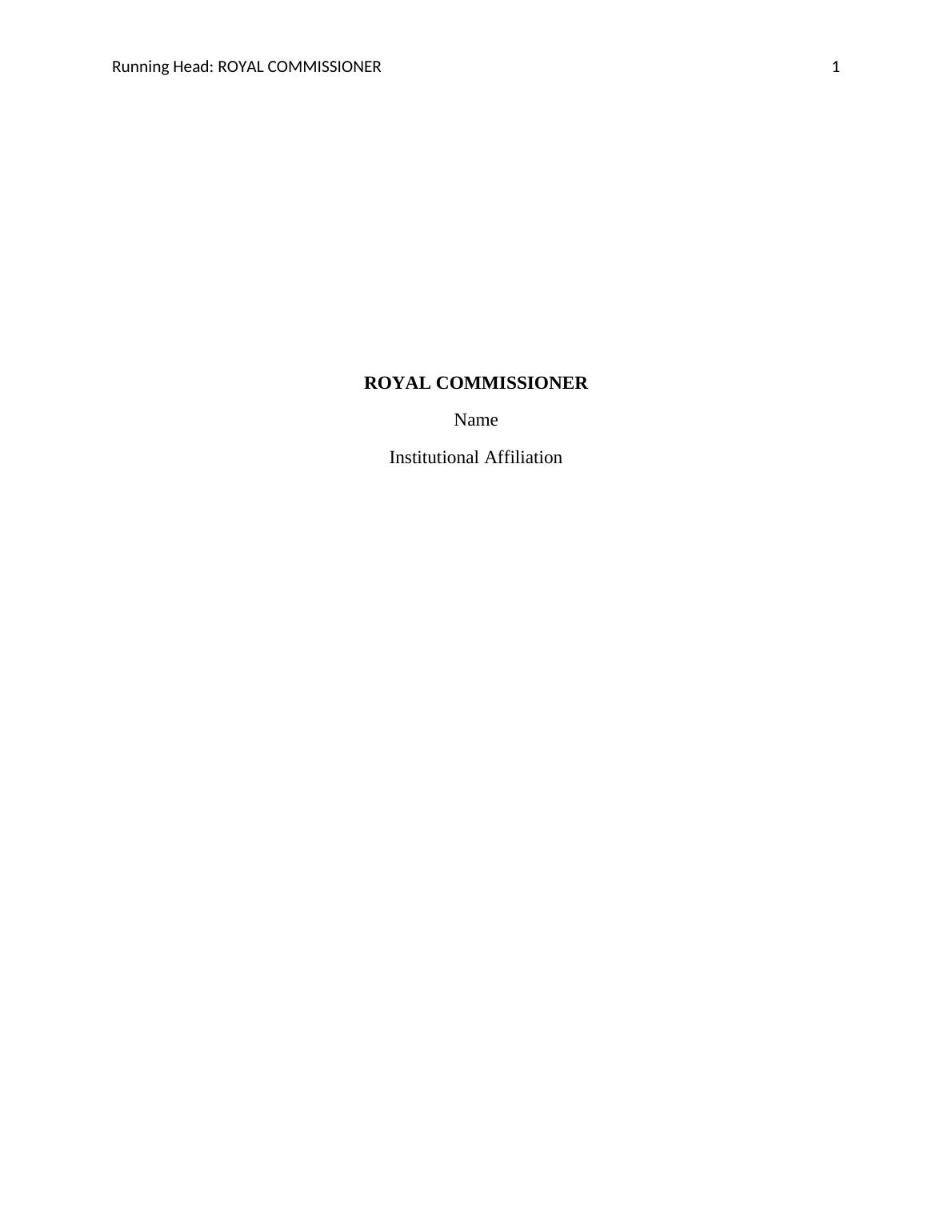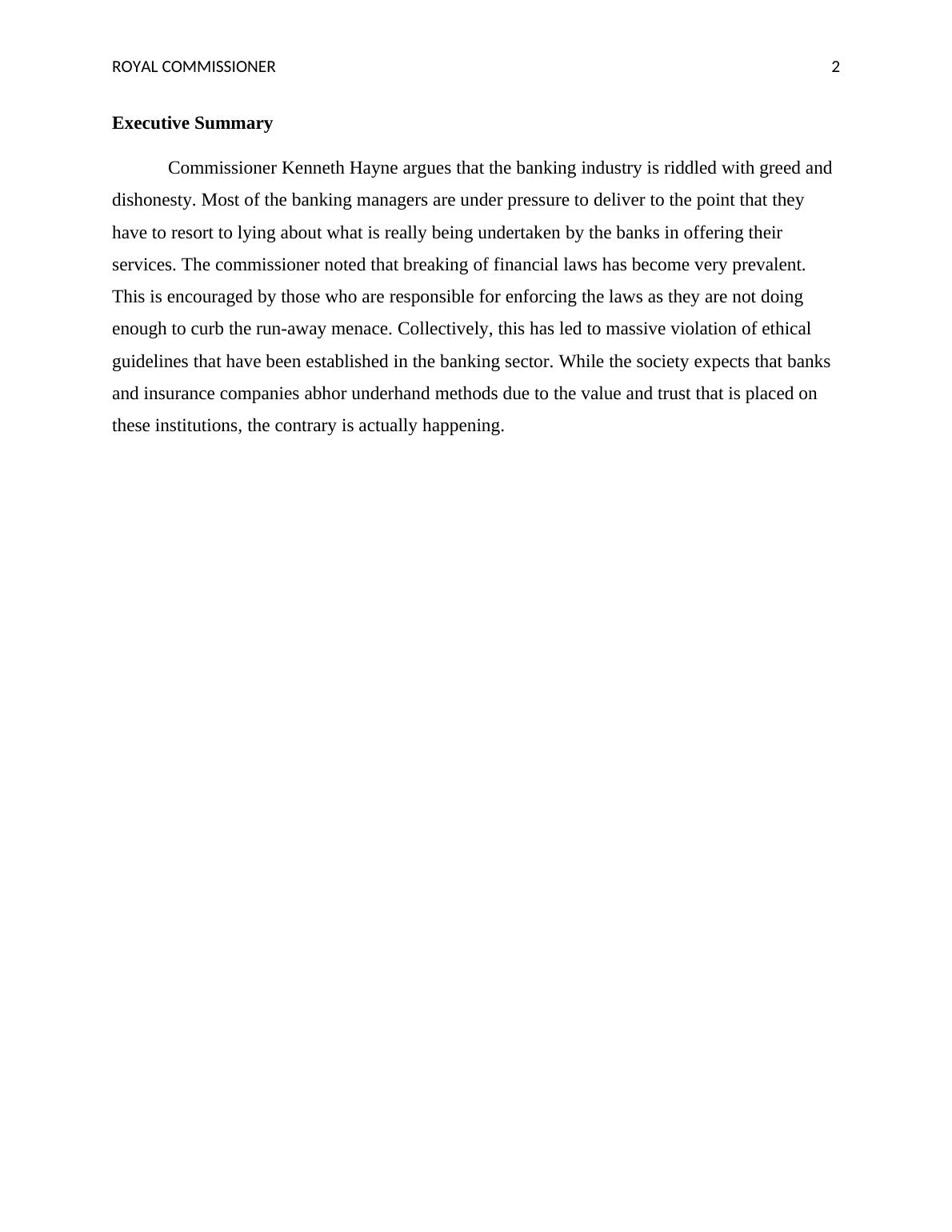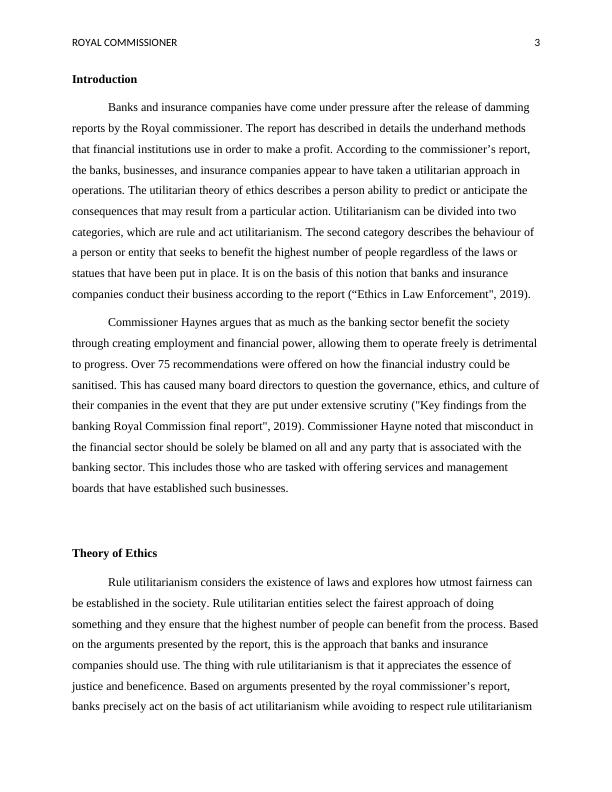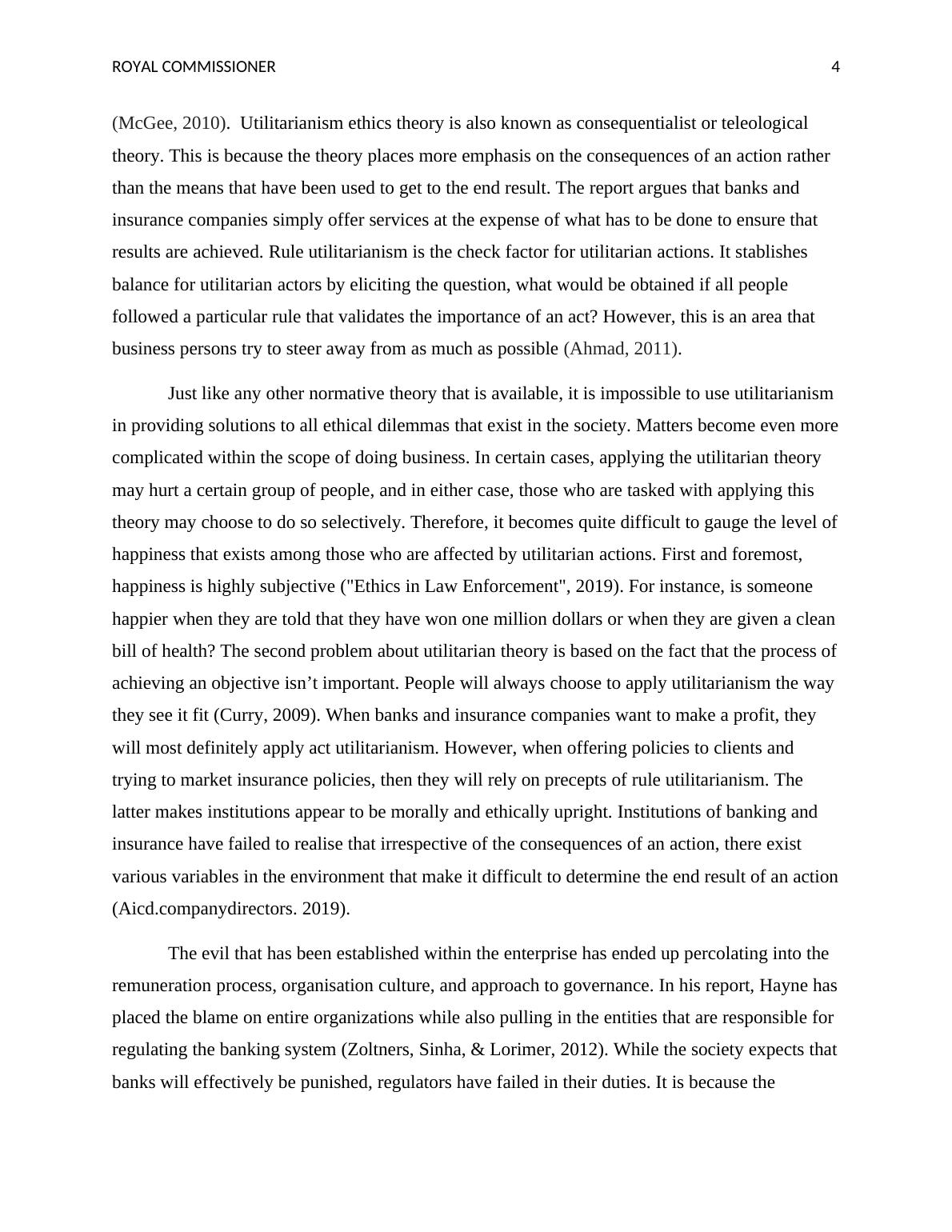Ethical Issues in the Banking Industry
Added on 2023-02-01
11 Pages3990 Words82 Views
Running Head: ROYAL COMMISSIONER 1
ROYAL COMMISSIONER
Name
Institutional Affiliation
ROYAL COMMISSIONER
Name
Institutional Affiliation

ROYAL COMMISSIONER 2
Executive Summary
Commissioner Kenneth Hayne argues that the banking industry is riddled with greed and
dishonesty. Most of the banking managers are under pressure to deliver to the point that they
have to resort to lying about what is really being undertaken by the banks in offering their
services. The commissioner noted that breaking of financial laws has become very prevalent.
This is encouraged by those who are responsible for enforcing the laws as they are not doing
enough to curb the run-away menace. Collectively, this has led to massive violation of ethical
guidelines that have been established in the banking sector. While the society expects that banks
and insurance companies abhor underhand methods due to the value and trust that is placed on
these institutions, the contrary is actually happening.
Executive Summary
Commissioner Kenneth Hayne argues that the banking industry is riddled with greed and
dishonesty. Most of the banking managers are under pressure to deliver to the point that they
have to resort to lying about what is really being undertaken by the banks in offering their
services. The commissioner noted that breaking of financial laws has become very prevalent.
This is encouraged by those who are responsible for enforcing the laws as they are not doing
enough to curb the run-away menace. Collectively, this has led to massive violation of ethical
guidelines that have been established in the banking sector. While the society expects that banks
and insurance companies abhor underhand methods due to the value and trust that is placed on
these institutions, the contrary is actually happening.

ROYAL COMMISSIONER 3
Introduction
Banks and insurance companies have come under pressure after the release of damming
reports by the Royal commissioner. The report has described in details the underhand methods
that financial institutions use in order to make a profit. According to the commissioner’s report,
the banks, businesses, and insurance companies appear to have taken a utilitarian approach in
operations. The utilitarian theory of ethics describes a person ability to predict or anticipate the
consequences that may result from a particular action. Utilitarianism can be divided into two
categories, which are rule and act utilitarianism. The second category describes the behaviour of
a person or entity that seeks to benefit the highest number of people regardless of the laws or
statues that have been put in place. It is on the basis of this notion that banks and insurance
companies conduct their business according to the report (“Ethics in Law Enforcement", 2019).
Commissioner Haynes argues that as much as the banking sector benefit the society
through creating employment and financial power, allowing them to operate freely is detrimental
to progress. Over 75 recommendations were offered on how the financial industry could be
sanitised. This has caused many board directors to question the governance, ethics, and culture of
their companies in the event that they are put under extensive scrutiny ("Key findings from the
banking Royal Commission final report", 2019). Commissioner Hayne noted that misconduct in
the financial sector should be solely be blamed on all and any party that is associated with the
banking sector. This includes those who are tasked with offering services and management
boards that have established such businesses.
Theory of Ethics
Rule utilitarianism considers the existence of laws and explores how utmost fairness can
be established in the society. Rule utilitarian entities select the fairest approach of doing
something and they ensure that the highest number of people can benefit from the process. Based
on the arguments presented by the report, this is the approach that banks and insurance
companies should use. The thing with rule utilitarianism is that it appreciates the essence of
justice and beneficence. Based on arguments presented by the royal commissioner’s report,
banks precisely act on the basis of act utilitarianism while avoiding to respect rule utilitarianism
Introduction
Banks and insurance companies have come under pressure after the release of damming
reports by the Royal commissioner. The report has described in details the underhand methods
that financial institutions use in order to make a profit. According to the commissioner’s report,
the banks, businesses, and insurance companies appear to have taken a utilitarian approach in
operations. The utilitarian theory of ethics describes a person ability to predict or anticipate the
consequences that may result from a particular action. Utilitarianism can be divided into two
categories, which are rule and act utilitarianism. The second category describes the behaviour of
a person or entity that seeks to benefit the highest number of people regardless of the laws or
statues that have been put in place. It is on the basis of this notion that banks and insurance
companies conduct their business according to the report (“Ethics in Law Enforcement", 2019).
Commissioner Haynes argues that as much as the banking sector benefit the society
through creating employment and financial power, allowing them to operate freely is detrimental
to progress. Over 75 recommendations were offered on how the financial industry could be
sanitised. This has caused many board directors to question the governance, ethics, and culture of
their companies in the event that they are put under extensive scrutiny ("Key findings from the
banking Royal Commission final report", 2019). Commissioner Hayne noted that misconduct in
the financial sector should be solely be blamed on all and any party that is associated with the
banking sector. This includes those who are tasked with offering services and management
boards that have established such businesses.
Theory of Ethics
Rule utilitarianism considers the existence of laws and explores how utmost fairness can
be established in the society. Rule utilitarian entities select the fairest approach of doing
something and they ensure that the highest number of people can benefit from the process. Based
on the arguments presented by the report, this is the approach that banks and insurance
companies should use. The thing with rule utilitarianism is that it appreciates the essence of
justice and beneficence. Based on arguments presented by the royal commissioner’s report,
banks precisely act on the basis of act utilitarianism while avoiding to respect rule utilitarianism

ROYAL COMMISSIONER 4
(McGee, 2010). Utilitarianism ethics theory is also known as consequentialist or teleological
theory. This is because the theory places more emphasis on the consequences of an action rather
than the means that have been used to get to the end result. The report argues that banks and
insurance companies simply offer services at the expense of what has to be done to ensure that
results are achieved. Rule utilitarianism is the check factor for utilitarian actions. It stablishes
balance for utilitarian actors by eliciting the question, what would be obtained if all people
followed a particular rule that validates the importance of an act? However, this is an area that
business persons try to steer away from as much as possible (Ahmad, 2011).
Just like any other normative theory that is available, it is impossible to use utilitarianism
in providing solutions to all ethical dilemmas that exist in the society. Matters become even more
complicated within the scope of doing business. In certain cases, applying the utilitarian theory
may hurt a certain group of people, and in either case, those who are tasked with applying this
theory may choose to do so selectively. Therefore, it becomes quite difficult to gauge the level of
happiness that exists among those who are affected by utilitarian actions. First and foremost,
happiness is highly subjective ("Ethics in Law Enforcement", 2019). For instance, is someone
happier when they are told that they have won one million dollars or when they are given a clean
bill of health? The second problem about utilitarian theory is based on the fact that the process of
achieving an objective isn’t important. People will always choose to apply utilitarianism the way
they see it fit (Curry, 2009). When banks and insurance companies want to make a profit, they
will most definitely apply act utilitarianism. However, when offering policies to clients and
trying to market insurance policies, then they will rely on precepts of rule utilitarianism. The
latter makes institutions appear to be morally and ethically upright. Institutions of banking and
insurance have failed to realise that irrespective of the consequences of an action, there exist
various variables in the environment that make it difficult to determine the end result of an action
(Aicd.companydirectors. 2019).
The evil that has been established within the enterprise has ended up percolating into the
remuneration process, organisation culture, and approach to governance. In his report, Hayne has
placed the blame on entire organizations while also pulling in the entities that are responsible for
regulating the banking system (Zoltners, Sinha, & Lorimer, 2012). While the society expects that
banks will effectively be punished, regulators have failed in their duties. It is because the
(McGee, 2010). Utilitarianism ethics theory is also known as consequentialist or teleological
theory. This is because the theory places more emphasis on the consequences of an action rather
than the means that have been used to get to the end result. The report argues that banks and
insurance companies simply offer services at the expense of what has to be done to ensure that
results are achieved. Rule utilitarianism is the check factor for utilitarian actions. It stablishes
balance for utilitarian actors by eliciting the question, what would be obtained if all people
followed a particular rule that validates the importance of an act? However, this is an area that
business persons try to steer away from as much as possible (Ahmad, 2011).
Just like any other normative theory that is available, it is impossible to use utilitarianism
in providing solutions to all ethical dilemmas that exist in the society. Matters become even more
complicated within the scope of doing business. In certain cases, applying the utilitarian theory
may hurt a certain group of people, and in either case, those who are tasked with applying this
theory may choose to do so selectively. Therefore, it becomes quite difficult to gauge the level of
happiness that exists among those who are affected by utilitarian actions. First and foremost,
happiness is highly subjective ("Ethics in Law Enforcement", 2019). For instance, is someone
happier when they are told that they have won one million dollars or when they are given a clean
bill of health? The second problem about utilitarian theory is based on the fact that the process of
achieving an objective isn’t important. People will always choose to apply utilitarianism the way
they see it fit (Curry, 2009). When banks and insurance companies want to make a profit, they
will most definitely apply act utilitarianism. However, when offering policies to clients and
trying to market insurance policies, then they will rely on precepts of rule utilitarianism. The
latter makes institutions appear to be morally and ethically upright. Institutions of banking and
insurance have failed to realise that irrespective of the consequences of an action, there exist
various variables in the environment that make it difficult to determine the end result of an action
(Aicd.companydirectors. 2019).
The evil that has been established within the enterprise has ended up percolating into the
remuneration process, organisation culture, and approach to governance. In his report, Hayne has
placed the blame on entire organizations while also pulling in the entities that are responsible for
regulating the banking system (Zoltners, Sinha, & Lorimer, 2012). While the society expects that
banks will effectively be punished, regulators have failed in their duties. It is because the

End of preview
Want to access all the pages? Upload your documents or become a member.
Related Documents
Ethics and Governancelg...
|15
|3895
|94
The Royal Commission of Australialg...
|13
|3128
|317
The Royal Commissioner Reportlg...
|6
|1598
|65
The Role of Accounting in Societylg...
|7
|1421
|90
Corporate Governance and Ethicslg...
|13
|3972
|355
Managing the Legal Environmentlg...
|8
|2000
|29
